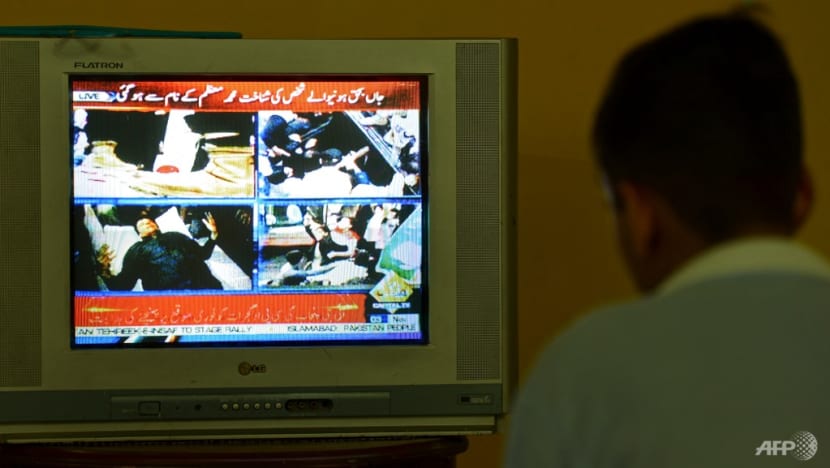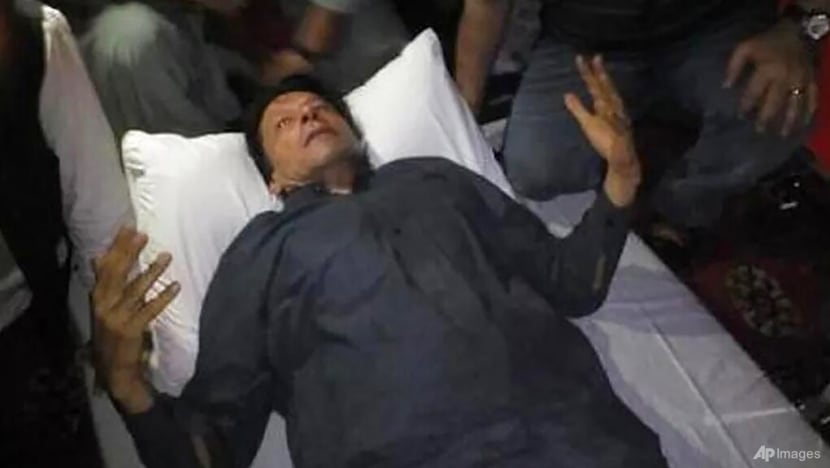Commentary: Pakistan won’t quickly recover from Imran Khan’s shooting
When news came in that former Pakistan prime minister Imran Khan had been shot at a political rally, it was hard not to recall the turmoil following Benazir Bhutto’s assassination, says Bloomberg Opinion's Mihir Sharma.

A boy watches a television channel showing the news of Pakistan's former prime minister Imran Khan on Nov 3, 2022. (Photo: AFP/Farooq Naeem)
NEW DELHI: Almost 15 years ago, on a cold winter evening in Rawalpindi, Pakistan’s most popular politician was killed at a political rally, just weeks before elections that she was expected to win.
When news came in late on Thursday evening that former prime minister Imran Khan — now unquestionably Pakistan’s dominant political figure — had been shot at a political rally, it was hard not to recall the turmoil following Benazir Bhutto’s assassination.
For a brief moment before she died, it had looked like Pakistan was on its way to prolonged political stability. Since her murder, that stability has seemed difficult to achieve.
The attack on Khan is likely to put any political equilibrium out of reach for years. Khan, ousted as prime minister earlier this year, was in the middle of a “long march” meant to drum up support for early elections.
His supporters already felt hard done by, blaming Pakistan’s all-powerful “establishment” for Khan’s lost majority in parliament. The attack on their leader might well cause their anger to curdle into permanent resentment.

CONSPIRACY THEORIES
Clips of the would-be assassin claiming to have acted alone are all over Pakistani media. Yet it is hard to imagine that claim being widely believed in a country already consumed by conspiracy theories.
Pakistanis will remember that nobody found out who killed Bhutto and be suspicious of any simple explanation, whether or not it is true. And they will find someone to blame: Already, pro-Khan protesters have vandalised symbols of the military’s power across the country.
Pakistan’s army was already playing defence against Khan’s resurgent party, the Pakistan Tehreek-e-Insaf.
Just a week ago, the country’s spy chief, Lieutenant-General Nadeem Anjum, held an unprecedented press conference in which he simultaneously insisted that the military was politically neutral and that Khan was a hypocrite who had made secret, “unconstitutional” demands of the army.
Never before has the head of Inter-Services Intelligence had to lower himself so far as to answer questions from the press corps.
Later this month, the most powerful post in Pakistan — chief of the army staff — was supposed to receive a new incumbent. Some had hoped that this might allow the military to turn its promise to stay out of politics into a reality — and that the departure of the current military chief, General Qamar Javed Bajwa, would allow Khan to move on from attacking the military for betraying him.
Now, the attempt on Khan’s life may create an almost irreconcilable divide between the corps commanders who have dominated Pakistan for decades and the populist insurgent they helped elevate to the premiership just four years ago.
Many of us have long anticipated a time when Pakistanis would turn against the military-dominated establishment that has so hobbled the country’s democratic development and economic growth. Yet Khan’s anti-Western rhetoric hardly inspires confidence either.
Khan’s supporters will point out that Pakistanis don’t care about concerns expressed by liberals in the West or elsewhere. The country no longer needs their backing.
UNSTABLE AND DIVIDED
But Pakistan — close to bankruptcy, wracked by the after-effects of climate change and burdened by an unproductive economy — can’t survive without outside protectors. And, of late, those protectors have generally been found in Beijing.
In fact, Khan’s successor as prime minister, Shehbaz Sharif, had gone to meet Chinese leaders this week, fully aware that China holds about 30 per cent of Pakistan’s US$100 billion external debt. The International Monetary Fund just had to shell out US$1.2 billion to Pakistan to prevent the country from defaulting.
In Beijing, Sharif had to endure some unexpectedly harsh words from Chinese President Xi Jinping about the safety of Chinese citizens working in Pakistan. (Earlier this year, three Chinese teachers were killed in a suicide bombing in Karachi.) Xi warned that China expected “a reliable and safe environment for Chinese agencies and nationals” in Pakistan.
The events of this week make Pakistan look anything but “reliable” and “safe". How can Beijing trust Sharif’s promises? Given how unstable and divided the country’s polity is now, how can any Pakistani government — with or without Imran Khan, with or without the military’s support — make promises it can keep?
China’s bet on Pakistan is beginning to look as bad as its bet on Russia.













